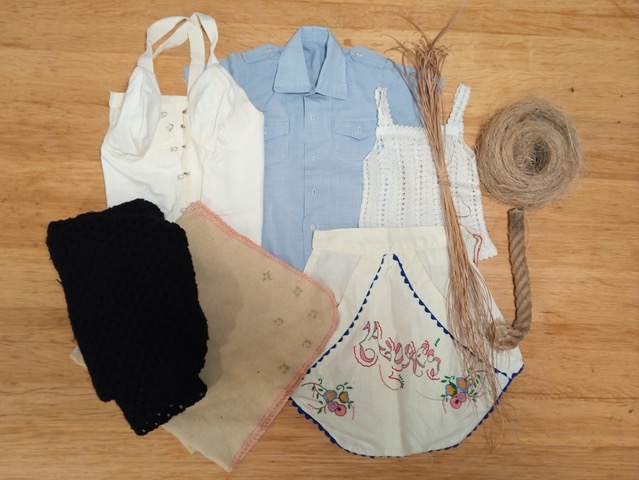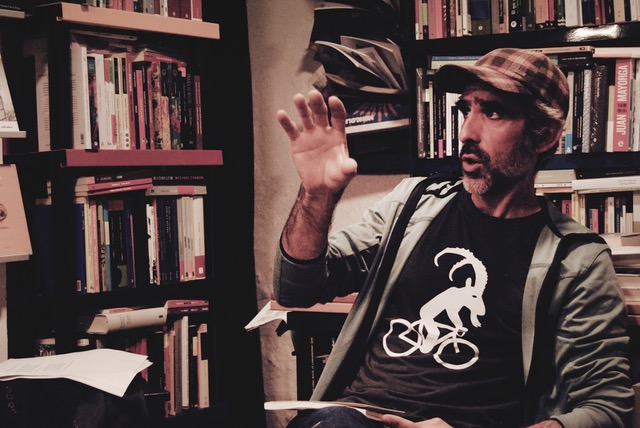Subscribe to our newsletter to keep up to date on all of our latest events, projects and news.
SubscribeThreads: Granada
Manchester City of Literature projectURDIMBRE VIVA
I
De Adoración, la madre
de mi padre, conservo todavía
tres saquitos
que apenas sí me pongo porque pican, un par de calcetines de basta lana parda
y esa bufanda larga y rojinegra
que en tardes de brasero fue tejiéndome mientras su voz cascada
me iba desenredando la madeja
de la crueldad humana
cuando era ella mozuela en la posguerra.
Y también la toquilla que en invierno se echaba para el trajín diario de una casa modesta.
II
Conservo de mi abuela Florentina,
la madre de mi madre,
la camisa de seda
que tan blanca y exacta me cosió
para cuando en la iglesia me endiñaron aquel primer hostión en plena infancia,
otras dos más baratas, de tergal,
la máquina primera de pedal que se compró con las tres mil pesetas de su boda
tras expresar cabal y razonada su renuncia al dispendio obligado de la luna de miel
y algún que otro bordado
de impecable factura, iniciales ornadas y motivo enigmático como el tatuaje indómito
que queda en la entretela de la vida
cuando algunas palabras se hacen cuerpo.
III
E incluso de mis dos abuelos algo
queda, creo.
Este acento que a veces me retumba en el pecho cuando anudo palabras es el deje cerrado de mi abuelo Manuel trenzando sogas de cáñamo, cargando arrobas
de esparto, lino, yute, tarareando.
Y esta tenaz prosodia,
esta sintaxis zurda, sin remiendos,
me dicen que me viene de mi abuelo Isidoro, si quienes lo trataron no me mienten.
IV
Y tú, hija, ¿qué harás
cuando mañana estés desnuda frente al odio? ¿Con qué te arroparás en la alta noche del miedo y de las falsificaciones?
¿Con cuál de mis chaquetas madeinchina? ¿Con todos nuestros muertos?
¿Con esa urdimbre viva y compartida que resiste en las lenguas
que como un don tu madre y yo te dimos?

LIVING WARP THREAD
I
From Adoración, my father’s
mother, I still preserve
three pullovers
that I hardly wear because they itch,
a pair of socks made of coarse brown wool,
and that long red-and-black muffler
that in evenings by the brazier she knitted me
while her cracked voice
slowly unraveled the skein
of human cruelty
when she was a girl in the postwar years.
And also the shawl she wore in winter
for the daily comings and goings of a modest household.
II
I preserve from my grandmother Florentina,
my mother´s mother
the silk shirt
so white and exact that she sewed
for when in church they whacked me
with that first host in the height of childhood,
two others, cheaper, made of terylene,
the first pedal sewing machine that she bought
with the three thousand pesetas from her wedding
after expressing as an upright matter of fact that she renounced
the obligatory wastefulness of a honeymoon
and a few needlework pieces
of impeccable craft, ornate initials
and puzzling motif like the indomitable tattoo
that persists in the inner lining of life
when certain words become substance.
III
And even from my two grandfathers something
remains, I believe.
This accent that from time to time resounds in my breast
when I join words is the strong drawl
of my grandfather Manuel braiding ropes
of hemp, lifting loads
of esparto, flax, jute, humming.
And this tenacious prosody,
this left-handed syntax, without patches,
they say it comes to me from my grandfather Isidoro,
if those who knew him do not lie.
IV
And you, child, what will you do
when tomorrow you stand naked in the face of hatred?
With what will you bundle yourself up in the deep night
of fear and fabrications?
With which of my made-in-china jackets?
With all our deceased ones?
With that living and shared warp
that resists in the tongues
that, as a gift, your mother and I gave you?
LUIS MELGAREJO (La Zubia, Granada, 1977) has published to date three poetry books: Libro del cepo (Hiperión, Madrid, 2000), with which he won the XV Hiperión Poetry Prize; Los poemas del bloqueo (Cuadernos del Vigía, Granada, 2008; 2nd corrected and expanded edition), which was awarded the Javier Egea Poetry Prize in 2005; and Tiritañas y guiñapos (Saltadera, Oviedo, 2017).
Unpublished poems and early versions of some of his texts have been included over recent years in numerous anthologies and literary magazines on both sides of the Atlantic. In collaboration with the collective La Palabra Itinerante, he researches in the field of scenic poetry and literary pedagogy, and, along with Argentinian guitarist Esteban Jusid and Granada-based visual artist Iván Izquierdo, a few years ago he developed Subdesarsur, an interdisciplinary show that combined poetry, music, and painting on stage.
He has conducted literary creation and reader animation workshops in libraries, educational centers, and adult education centers throughout Andalusia. He was also part of the social economy project Enfrentico la iglesia S.C.A., a cooperative responsible for the day-to-day operations of La Casa Con Libros in La Zubia (Granada), a diverse space that for almost 20 years hosted weekly cultural activities of all kinds (music, poetry, book presentations, exhibitions, creative writing workshops, film club, etc.). He holds a degree in Hispanic Philology from the University of Granada and a Master’s in Publishing from the University of Salamanca. Currently, he owns a bookshop.

